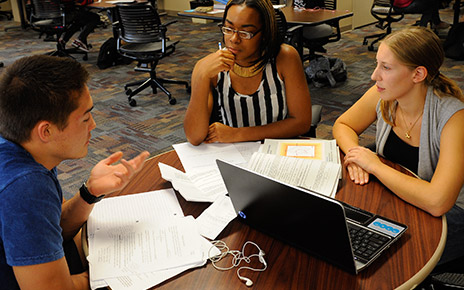Published on Oct. 30, 2016

College can be a wake-up call for many first-year students as the difference between high school and college is sometimes quite pronounced. It’s a feeling James Bohnett, a senior political science major at Mizzou, had his first year of college, but one The Learning Center helped him overcome.
Bohnett, a member of the Mizzou Wheelchair Basketball team, had a tutor his freshman year. His experience with the tutor at the Learning Center helped him in several ways.
“First,” he says, “it gave me an opportunity to ask even the most elementary of questions to someone whom I wouldn’t be embarrassed to ask. Sometimes there are days when I can’t even explain why two plus two equal four.”
Having someone he could ask any question to was instrumental in his success. His tutors kept him motivated to learn, made the material interesting and gave him confidence that he could succeed.
Bohnett is just one of the thousands of MU students who use the Learning Center to help them succeed academically each year. In 2015-16, the center served a total of 8,765 individuals, according to its annual report.
Phil Deming, director of the Learning Center for nine years, says the main goal of the center is simply to help students be academically successful. To do this, the center offers various programs for MU students, several of which are open to all students.
The Writing Center, for example, offers face-to-face or online writing help to all students looking for guidance or feedback on any writing assignment.
Open help sessions, another Learning Center program that is available to all students, typically exist for large-enrollment courses that many students take in their first year. Student tutors lead open help sessions for 40 to 45 courses, including economics, Spanish, math, accountancy, French, statistics and more.
Study plan consulting is another program any student may take advantage of, but instead of offering one-time help in times of worry, it takes a more holistic approach to the semester. Consultants meet with students one-on-one to talk about their schedules, when exams are, when professors’ office hours are and other such elements. Sessions also involve grade calculation to help students determine the best grades they can achieve based on already-graded assignments, which can help students stay on track the rest of the semester.
“It’s an overall approach to your semester,” Deming says, “a plan for how to best meet your goals.”
All students at MU can use these programs for free. Additional services include content tutoring online with NetTutor, learning strategies specialists and exam reviews for select classes.
Some programs in the Learning Center have some restrictions, including the TRiO Student Support Services Program and the Collaborative Learning to Achieve Student Success (CLASS) program.
The TRiO program provides funding to undergraduates from underrepresented groups who are first-generation college students, have financial need or a disability and have an academic need. The TRiO Student Support Service grant funds this program with slightly over $3 million during the five-year grant cycle. Students who meet federal guidelines receive a regularly-scheduled tutoring appointment once or twice a week. So far, the grant has allowed the Learning Center to serve around 650 students each year and this will increase to 670 this year.
CLASS is similar to TRiO in terms of the services it offers, but is available only to underrepresented groups that are not covered by TRiO, such as students with disabilities who don’t meet the TRiO criteria, other underrepresented minority students and veterans.
For Bohnett, the Learning Center’s programs have helped him greatly in his academics.
“College is already a heavy investment, both in money and in time,” he says. “Tutoring has alleviated a lot of the potential costs for me. Rather than be confused all the way up to a test, I would simply ask my tutor to explain a procedure or what step I may be missing.”
His experience with his tutors, in particular, encouraged him to become a tutor himself, and he’s learned just as much being a tutor as he did being a tutee. “I have a better understanding of the material I tutor in,” he says. “I’ve learned how to explain problems with a variety of different perspectives and examples.”
Deming wants all MU students to benefit from the Learning Center services as Bohnett has. With 14 full-time staff members and over 300 tutors, there is a lot of help available.
Deming stresses that tutoring is not remedial. Many times, the students who use the Learning Center are trying to maintain prestigious scholarships or get admitted to a particular academic program.
“It’s not just for students who are struggling,” Deming says. “We help students achieve at whatever level they’re aspiring to.”